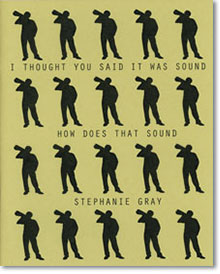Stephanie Gray
I thought you said it was sound / how does that sound
$8 ppd. (sold out)

My own private ontology for the two series, I thought you said it was sound / how does that sound:
I thought you said it was sound came about in one of those ways where maybe a poet is, or any artist, really is in between that state between waking and sleeping, the staying up to finish past the time the midnight oils are gone but still there. I had read an amazing interview with Marie Ponsot, who when asked by the interviewer how she managed to write with every day responsibilities, especially children - Marie said “you always have 10 minutes.” I took that literally to heart and said to myself, at a time when I sensed this series was trying to form but it just wasn’t coming out, that I would write 10 minutes every day right before I went to sleep no matter what for at least two weeks. So, I thought you said it was sound came out of that. They were written and then edited yet were created in that space. So Marie's advice got me there. For awhile, I had been wanting to think about how to get “into” sound, without any cliché or irony or misinterpreted dreaminess as corniness, and it all seemed on the tip of my tongue, but how to create it, write it, how to sound it out? How to imagine and get into sounds? It reminded me of being a little kid when you closed your eyes and I used to try to “see” the dots in the darkness that looked like stars and wondered if I could time travel through it. I wondered how I was seeing those dots if my eyes were closed. Getting into sound and colloquial phrases of sound, in both the earnest sense of the phrase and the colloquial sense – that is what I wanted to dive into and report back to the reader with. As one with a hearing loss, it took on an additional meaning as well (though obviously any one can write about this regardless of what their hearing is like) – certain types of sound are harder to get into than others and certain mispronunciations create circles of understanding sound. In trying to dive into the ontology behind this series, how does this sound?
For the second series in the chapbook, how does that sound, I was not necessary obsessed with getting into sound per se, but more dancing around it, getting through to an epistemological rock and roll around it – which wouldn’t be so far fetched to say since there are some classic rock songs and transistor radios that appear again and again though I wasn't consciously aware that I kept referencing them over and over. My hearing loss means I have literally memorized all the small talk phrases that never change, and I know all the “throwaway talk” that is being said. I am obsessed with these extra little phrases and how they pile up, how they can mean something in their isolation or fusing and poeticizing. Because “getting” specific phrases is harder for me in loud environments, I find I compensate by trying to “get” all the things that could repeat from conversation to conversation. This isn’t the only thing I was thinking of when I wrote this series and indeed I might not have been thinking of it and didn’t until now, stepping back. I find there is something alluring between the fact of repetition whether something is repeated due to hearing or repeated for an artistic purpose. And when it might be both, what does that mean? I am mystified by the philosophical and epistemological that seep through rumination and poetry that involves clarification or isolation of the most mundane phrases, and then with rhythmic movement of prose poem that asks the reader to stick along for the ride through the internal beat, not stanzas all the time. Can u feel it? How does that sound? Does it sound like how I said it? Okay sounds good.
Bio:
Stephanie Gray’s first book of poems, Heart Stoner Bingo, was published by Straw Gate Books in 2007. Magazine and journal publications include Sentence, Aufgabe, Brooklyn Rail, EOAGH, 2ndAvenuePoetry, Boog City Reader, and The Recluse. Reading series where she’s read live with her films include Segue and the Poetry Project’s Friday night series. Also a super 8 filmmaker, her experimental / city symphony / and queer-themed films have screened internationally at festivals such as Viennale, Oberhausen, Chicago Underground, and queer fests such Frameline, Mix, and Inside Out. Her recent film You know they want to disappear Hell’s Kitchen as Clinton, a “poetic film letter” to E.B. White’s essay Here is NY, was included in the 2011 Black Maria Film Festival Tour where it was one of 10 Jury’s Choice First Prizes; other screenings included the E-Poetry Fest in Buffalo. She has received a New York Foundation for the Arts Fellowship and grants from NYSCA’s Finishing Funds and Distribution Grant programs.